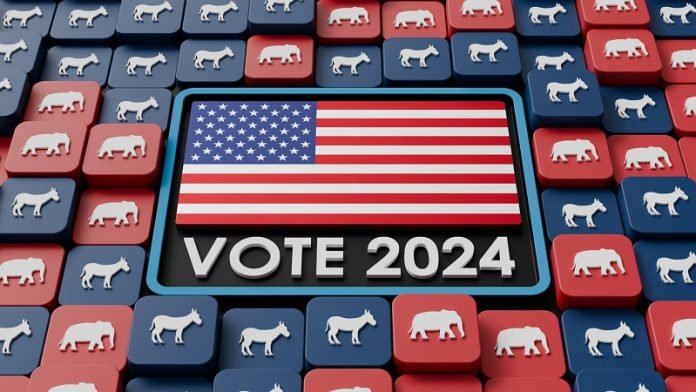
Simon Harris is set to become Ireland’s prime minister at 37. Montenegro’s president is also 37. And Chile’s president is 38. When will America’s highest office get younger?
What do countries like Chile, Montenegro, Ireland and France have in common?
They elected or appointed individuals in their 40s and late 30s as presidents or prime ministers.
In April, Simon Harris, 37, will become Ireland’s prime minister, replacing Leo Varadkar, who took office in 2017 at the age of 38.
Montenegro’s president, Jakov Milatović, is 37.
Chile’s president, Gabriel Boric, is 38.
And at the age of 39, Emmanuel Macron became the youngest president in French history.
In the United States, the minimum age to become president is 35. Despite that, Americans have only elected nine presidents under the age of 50 — the most recent, Bill Clinton, 46, in 1992, and Barack Obama, 47, in 2008.
Joe Biden is 81. His opponent, former President Donald Trump is 77.
Entrepreneur Vivek Ramaswamy sought the Republican nomination at age 38, but dropped out of the race after the Iowa caucuses.
Why aren’t there more young presidential candidates?
Age is only one factor
Costas Panagopoulos, head of Northeastern University’s political science department, says the answer is complicated.
“Age may be one factor that voters consider, but it is one among many other factors that voters may take into consideration when coming up with their voting preferences,” says Panagopoulos, who ran for the state legislature in Massachusetts when he was 19 years old.
“I didn’t win that election,” he says. “But I can tell you firsthand how challenging it is for young people who have an interest in politics to sometimes break through.”
Youthful candidates may offer fresher ideas and perspectives, Panagopoulos says, but an older candidate likely has more experience — in the public or private sector.
Both young and older candidates can be talented, charismatic and experienced, he says.
“Parties want to win,” he says.
Experience is often necessary
One of the biggest predictors of that, Panagopoulos says, is if a candidate has previously run a campaign and been elected to office.
For a presidential candidate, that would mean higher office.
“Generally, they would have served in high-level elected office such as in Congress or as a governor,” Panagopoulos says.
There are outliers.
“We have other examples like Donald Trump not having served in elective office in the past,” he says.
Participation has fallen off
Colin Brown, associate teaching professor of political science at Northeastern, says the participation of young people in the political process in the U.S. has fallen in recent years.
In addition to the age of the current presidential candidates, there are a number of reasons, he says, that could explain that.
Younger adults might have less time and resources to be involved in politics than earlier generations of politicians did at their age.
The cost of being engaged in politics has risen, Brown says.
“If nobody under 40 can afford a house, they can’t afford a congressional campaign,” he says.
A lack of respect?
Politicians in the U.S. have also become less respected, Brown says, deservedly or undeservedly.
“It makes people want less to be involved in politics because they’re getting more abuse,” he says. “They’re getting less respect, and it’s seen as potentially a negative.”
There are fewer rewards for making a career out of politics, Brown says. Most positions don’t pay well and involve long hours and constant communication with constituents.
Brown believes that age is a single dimension that political candidates can’t control, compared to other things. And that isn’t fair.
“You can’t get away from the fundamental fact that all age groups, all generations, all cohorts, have some right to be represented,” he says.
Why is Europe different?
Europe has seen younger leaders emerge, but for extraordinary reasons, according to Pablo Calderon Martinez, associate professor of politics and international relations at Northeastern’s London campus.
For example, Pedro Sánchez, prime minister of Spain, took office in 2018 at age 46 after the previous government had collapsed. And Rishi Sunak, the 43-year-old prime minister of the United Kingdom, is wealthy.
The U.K. system discourages young people who are not wealthy from seeking office, Calderon Martinez says, as well as minorities and people from diverse ethnic backgrounds who often have lower socioeconomic status.
Chances of young politicians coming to power are much better in Latin America, Calderon Martinez says, because the positions often pay very well. Politicians there are also very active on social media.
Nayib Bukele, 42, president of El Salvador, won his campaign in 2019 using Twitter, Facebook and Instagram to reach younger voters, Calderon Martinez says.
“Youth is a huge electoral block,” he says.
Students can be influential
In Chile, Boric rose in popularity as president of the influential student federation during the student protests of 2011.
“A lot of politicians learned the trade in the student union,” Calderon Martinez says. “That explains why Chile particularly has a lot of young politicians entering the fray — because the student unions give them that platform.”
In Calderon Martinez’s opinion, the age of candidates doesn’t matter as much as their experience in government.
“You could be relatively inexperienced in your late 70s and be a newcomer in politics,” he says.
Countries are incredibly complex organizations of fragile arrangements, he says.
“I do think there has to be a certain degree of knowledge and understanding of government from either being in government or in opposition or in local politics,” he says. “That’s why we have professional politicians, whether we like it or not.”
Written by Alena Kuzub/ Northeastern University.




